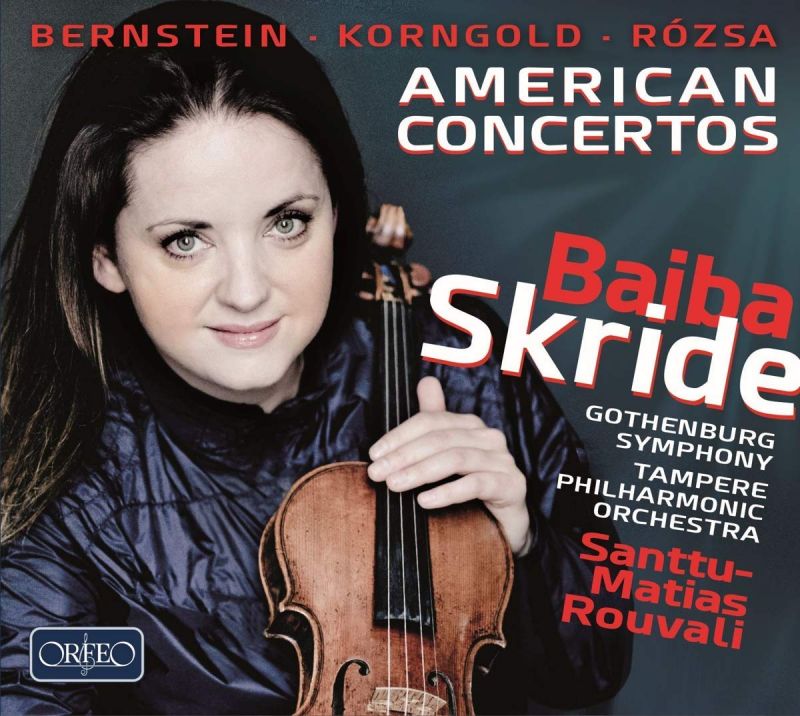Baiba Skride: American Concertos
View record and artist detailsRecord and Artist Details
Composer or Director: Leonard Bernstein, Miklós Rózsa, Erich Wolfgang Korngold
Genre:
Orchestral
Label: Orfeo
Magazine Review Date: 11/2018
Media Format: CD or Download
Media Runtime: 117
Mastering:
DDD
Catalogue Number: C932 182A

Tracks:
| Composition | Artist Credit |
|---|---|
| Serenade |
Leonard Bernstein, Composer
Baiba Skride, Violin Gothenburg Symphony Orchestra Leonard Bernstein, Composer Santtu-Matias Rouvali, Conductor |
| Concerto for Violin and Orchestra |
Erich Wolfgang Korngold, Composer
Baiba Skride, Violin Erich Wolfgang Korngold, Composer Gothenburg Symphony Orchestra Santtu-Matias Rouvali, Conductor |
| Symphonic Dances from 'West Side Story' |
Leonard Bernstein, Composer
Leonard Bernstein, Composer Santtu-Matias Rouvali, Conductor Tampere Philharmonic Orchestra |
Author: Andrew Farach-Colton
Miklós Rózsa’s Concerto (1953), also composed for Heifetz, is much more of a rarity – and understandably so. The orchestration is attractively lush, the language vaguely and pleasantly evocative of Bartók, but there’s a lot of meandering, too. Heifetz, in his pioneering recording, helped sustain tension by keeping things moving; Skride opts to observe Rózsa’s tempo markings more thoughtfully. In the first movement, for example, she gives us the passionato while respecting the cautionary Allegro non troppo indication. She takes a leisurely tempo for the Lento cantabile, making it into an amorous reverie full of idealism and vulnerability. Heifetz is Heifetz, of course, and his highly volatile, intensely lyrical account should remedy the grousing that his playing is chilly. Skride is persuasive in her own way, however, particularly as she plays it with such beautiful, singing tone.
The Serenade (1954) is among Bernstein’s most perfect, concise creations and Skride really digs into it. Note how she starts the introductory solo so simply and sincerely, then gradually increases the intensity in her tone as the string orchestra joins her. It’s absolutely gripping as well as plain gorgeous, her glistening tone reflecting the glitter of percussion. I do wish she and the Gothenburg Orchestra put more swing in the faster, dancelike sections of the work. They’re a bit stiff, as if this were Stravinsky. But that in itself is interesting, as it sets the Serenade down squarely in the European tradition where it rightly belongs. Alas, Santtu-Matias Rouvali isn’t nearly as persuasive in the Symphonic Dances from West Side Story. Where’s the lilt in the Scherzo (‘Maria’) or the insinuation of sleaze and slickness in ‘Cool’? Even the ‘Rumble’ is over-choreographed, eliciting no sense of danger or impending tragedy.
Both orchestras provide excellent support in the concertos, however, although differing sound quality has a surprisingly significant effect. The Gothenburg recording puts orchestra and soloist practically in your lap, with unusually powerful bass; in Tampere, the engineers find a more natural balance but the relative lack of impact is conspicuous.
Discover the world's largest classical music catalogue with Presto Music.

Gramophone Digital Club
- Digital Edition
- Digital Archive
- Reviews Database
- Full website access
From £8.75 / month
Subscribe
Gramophone Full Club
- Print Edition
- Digital Edition
- Digital Archive
- Reviews Database
- Full website access
From £11.00 / month
Subscribe
If you are a library, university or other organisation that would be interested in an institutional subscription to Gramophone please click here for further information.




